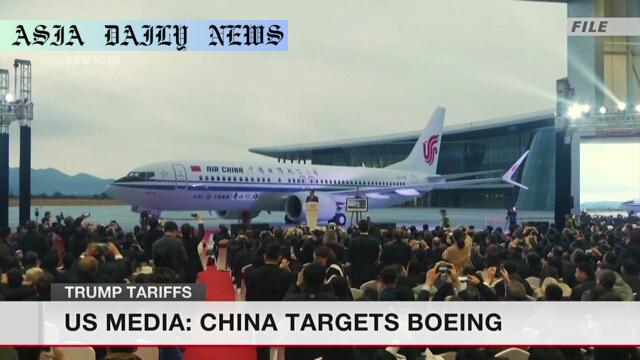Boeing faces financial strain as China halts aircraft deliveries amidst escalating US-China trade war.

Introduction: Boeing Caught in US-China Trade Conflict
The escalating trade war between the United States and China has entered a new and precarious phase, targeting one of the most significant players in global aviation: Boeing. The Chinese government has reportedly instructed its airlines to halt deliveries from Boeing and cease purchasing parts and equipment from US manufacturers. This bold maneuver underlines Beijing’s retaliation against increased tariffs on Chinese imports, triggered by recent US actions.
The backdrop of this issue is a historically complex diplomatic and economic rivalry between the United States and China. With tariffs climbing to 145% on Chinese goods entering the US and retaliatory measures escalating tariffs on American goods by up to 125%, the situation is far from amicable. For Boeing, a beleaguered business already reeling under financial strain and production delays, this development spells uncertainty.
The Financial Impact on Boeing
As one of the world’s largest aircraft manufacturers, Boeing has long relied on Chinese orders to bolster its financials. In fact, China represents a critical market for Boeing, given the nation’s rapidly growing aviation needs. With this latest suspension of deliveries, coupled with the Chinese government’s directives to end dependence on American-made aircraft-related products, Boeing faces an intense financial crunch.
Due to pre-existing challenges arising from the COVID-19 pandemic, grounding of its 737 MAX aircraft, and an already burdened supply chain, Boeing was banking on large-scale deliveries to China to bounce back into profitability. These geopolitical developments may push the US-based airplane manufacturer into deeper turmoil, further exacerbating uncertainties in the global aviation sector.
Geopolitical Nuances: A Deepening Divide
This incident reflects not just a failing business relationship between China and Boeing but also a broader deterioration of US-China ties on all fronts. The trade conflict is no longer constrained to abstract tariffs but has spilled into significant corporate affairs, impacting jobs, industries, and economies in both nations. The restrictions imposed by China send a clarion message to Washington about its dissatisfaction with US tariffs on Chinese goods.
At the same time, this trade dispute underscores the risks that large US corporations face while depending heavily on rapidly expanding Chinese markets. It is a cautionary tale about the potential vulnerabilities placed on companies due to global political dynamics. For nations, the interdependent yet oppositional dynamics between the US and China are bound to have rippling effects on global economies.
Trump’s Criticism: Political Ramifications
Predictably, US President Donald Trump has seized the opportunity to comment on China’s actions. His criticism highlights the nation ‘reneging on the big Boeing deal,’ a key agreement that had been celebrated during his tenure. This brings a potent political angle to the crisis as it becomes a point of debate on American approaches to foreign trade.
The suspension of the Boeing deal, regardless of political positioning, also signals Beijing’s strategic determination to pressure Washington. This isn’t simply corporate or economic retaliation; it is Beijing’s response to years of perceived economic aggression by the United States, now culminating in visible resistance.
Conclusion: Uncertain Futures
As the Boeing debacle unfolds, it remains to be seen how the situation will impact everything from diplomatic ties to the global aviation sector. For Boeing, increasing diversification in its customer base and fortifying its economic standing will be pivotal to weathering this challenging period. For the US, the larger implications of the continuing trade war are significant priorities that need to be addressed before they cause broader damage to corporations and citizens.
Commentary
Escalating Trade Conflicts: A Point of Concern
The US-China trade war has long been a matter of global intrigue. However, the latest chapter targeting Boeing adds a layer of complexity that could redefine the way businesses across the world perceive trade disputes. It is not merely a tussle over tariffs anymore—it is an issue that has the potential to disrupt global industries, such as aviation, that are already in dire need of rehabilitation post the COVID-19 downturn.
The bold move from China to halt Boeing deliveries is as much an economic statement as it is a political one. With Boeing long being hailed as one of America’s industrial behemoths, its perceived economic decline could be symbolic of larger economic vulnerabilities that come in the wake of prolonged trade aggression. This situation is a wake-up call—not just for the countries involved, but for the global economy as a whole.
The Stakes for Boeing’s Survival
Boeing’s position as one of the major suppliers in the aviation market is now precarious. China’s actions are likely to cause a ripple effect, leading other nations to consider lessening their reliance on American aviation technology if it provides stability and guarantees. Especially with internal operational challenges, Boeing must now consider how it can reposition itself in a world increasingly defined by political and economic polarizations.
Though there may be temptation to view this conflict as largely political, its business implications cannot be understated. The era of globalization, marked by an interconnected global market, is witnessing clear fractures that corporations must adapt to. At the center of global aviation diplomacy, Boeing finds itself in a pivotal role amidst these adjustments.
A Way Forward: Mitigation and Diplomacy
The global economy thrives when industries and nations work together in harmony. As such, the hope remains that diplomatic channels may eventually soften the impact of this trade conflict. Both the US and China have much to gain from collaborative trade efforts; however, bilateral partnerships require trust—a quality seemingly absent between Washington and Beijing.
If anything, the Boeing debacle underscores the need for political leaders to address conflicts through negotiation and mutual understanding—rather than allowing world-class corporations to bear the brunt of international friction. It will be interesting, and indeed necessary, to observe how this situation resolves in the months to come.


